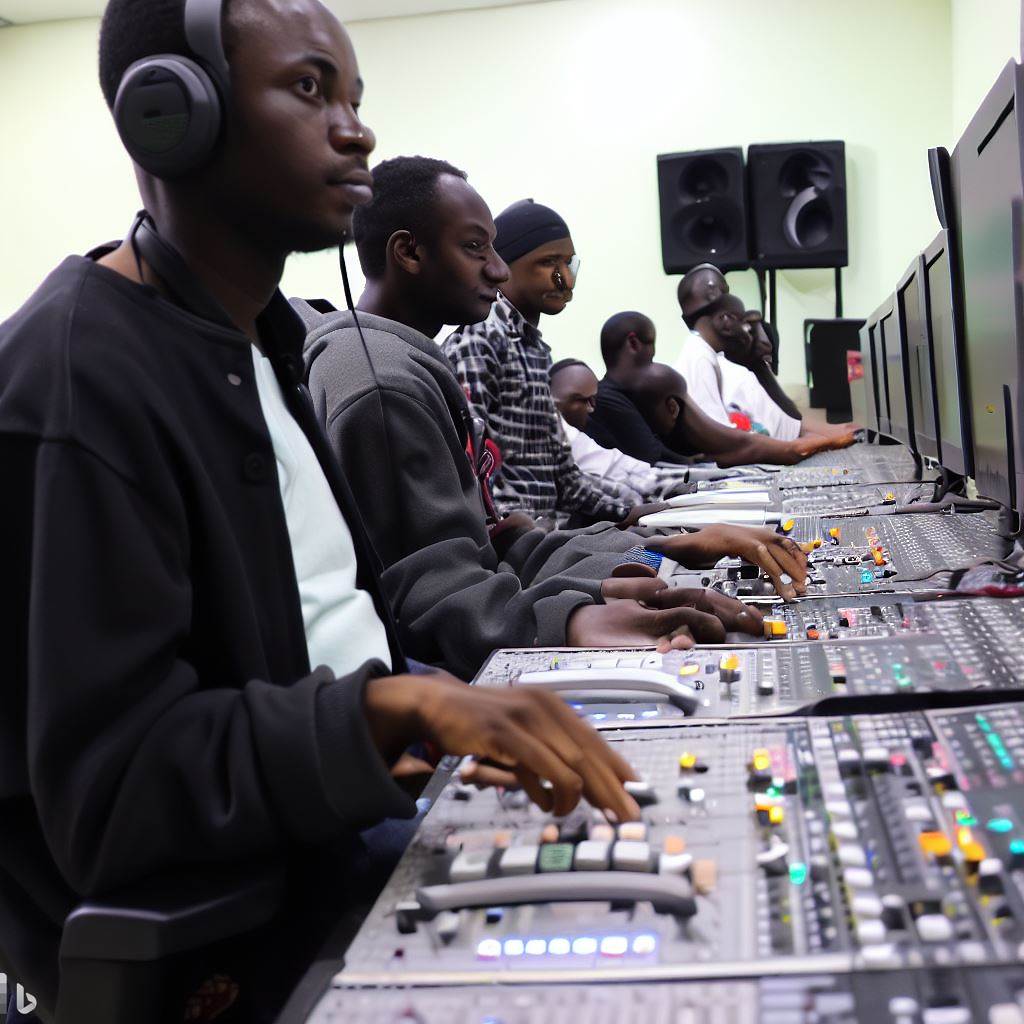Introduction
In the world of advertising and marketing, understanding the impact of culture is paramount. Nigeria, with its diverse cultural heritage, holds particular importance when it comes to copywriting.
This blog post explores how Nigerian culture shapes copywriting, emphasizing understanding cultural nuances for impactful communication.
In Nigeria, effective marketing relies on copywriting. It propels product promotion and service communication to audiences.
In this blog post, we’ll define copywriting and its ties to Nigerian culture for a vibrant exploration.
Definition and concept of copywriting
Copywriting is the art of creating persuasive and engaging content aimed at promoting a product or service.
It involves crafting compelling messages that resonate with the target audience and motivate them to take action. Copywriting is a crucial component of marketing and advertising strategies.
1. The significance of copywriting in marketing and advertising
Copywriting serves as the voice of a brand, conveying its message and values to the target audience. It helps create brand awareness, drive sales, and establish a strong brand image.
Effective copywriting can captivate readers, evoke emotions, and persuade them to make a purchase.
2. Creating persuasive and engaging content
Copywriting involves crafting content that captures the attention of the target audience and compels them to take the desired action. The following elements are essential for creating a persuasive and engaging copy:
- Understanding the audience: Copywriters must have a deep understanding of the target audience’s demographics, preferences, and needs.
This knowledge helps them tailor the content to resonate with the audience. - Utilizing storytelling: Storytelling is a powerful tool in copywriting. By telling relatable stories, copywriters can connect with the audience emotionally and thereby increase engagement.
- Using persuasive language: Copywriters employ persuasive language techniques such as using powerful words, creating urgency, and emphasizing the benefits of the product or service.
Such language convinces the audience to take action. - Incorporating cultural references: In Nigeria, copywriters need to be aware of the local culture and incorporate references that resonate with the target audience.
This ensures that the content is relatable and impactful.
3. Influence of Nigerian culture on copywriting
Nigerian culture greatly affects copywriting, as it shapes the preferences, values, and beliefs of the target audience.
To effectively engage Nigerian consumers, copywriters must be conscious of the following cultural aspects:
- Language: Copywriters should use the appropriate language that resonates with the target audience.
Nigeria is a linguistically diverse country with multiple ethnic languages, so tailoring the content to specific regions or language groups can be highly effective. - Cultural symbols: Incorporating cultural symbols, such as traditional attire or local landmarks, can create a sense of familiarity and pride among Nigerian consumers.
This helps establish a connection and builds trust with the audience. - Developing trust: Nigerian consumers value trust and authenticity.
Copywriters should focus on building trust by highlighting the credibility of the brand, testimonials from satisfied customers, and any relevant certifications or awards. - Respecting traditions and values: Copywriters need to be mindful of cultural sensitivities and ensure that their content respects Nigerian traditions and values.
This includes avoiding stereotypes, offensive language, or anything that may be considered disrespectful.
Copywriting in Nigeria involves creating persuasive and engaging content that is tailored to the cultural preferences and values of the target audience.
By incorporating cultural references, utilizing persuasive language, and understanding the audience, copywriters can effectively promote products or services and achieve marketing success.
Read: Key Challenges and Solutions for Nigerian Copywriters
Understanding Nigerian culture
Understanding Nigerian culture is essential for effective copywriting in Nigeria. Nigerian culture is incredibly diverse and has a rich heritage that influences various aspects of life in the country.
1. Overview of Nigerian Culture
Nigeria is home to over 250 ethnic groups, each with its distinct cultural practices, traditions, and languages.
This diversity is a result of historical migrations, intermarriage, and trade among different communities.
The three major ethnic groups in Nigeria are the Hausa-Fulani in the northern region, the Yoruba in the southwestern region, and the Igbo in the southeastern region.
However, there are numerous smaller ethnic groups spread across the country. Nigerian culture is characterized by vibrant music, dance, art, folklore, and cuisine.
The country’s cultural festivals, such as the Eyo festival in Lagos and the Durbar festival in Kano, showcase the richness of Nigerian traditions.
2. Influence of Various Ethnic Groups, Languages, and Religions
Each ethnic group in Nigeria contributes to the overall cultural fabric of the country. The Hausa-Fulani, for example, are predominantly Muslims and have influenced the practice of Islam in the northern states.
The Yoruba are known for their rich mythology, traditional kingship system, and vibrant festivals like the Olojo festival in Ife. They predominantly practice Christianity and traditional Yoruba religion.
The Igbo, on the other hand, have a strong entrepreneurial spirit and are known for their vibrant masquerade festivals. They primarily practice Christianity and traditional Igbo religion.
Various languages are spoken across Nigeria, with the major ones being Hausa, Yoruba, and Igbo.
English, inherited from the colonial era, serves as the official language and is widely spoken in urban areas and for business transactions.
Religion also plays a significant role in Nigerian culture, with a mix of Christianity, Islam, and traditional indigenous religions being practiced.
This religious diversity influences people’s values, beliefs, and perspectives.
3. Importance of Respecting Cultural Values and Traditions in Copywriting
In copywriting, it is crucial to respect and understand cultural values and traditions to effectively communicate with the Nigerian audience.
A deep understanding of the target audience’s culture helps create relevant and relatable content.
Copywriters should consider the cultural nuances, preferences, and sensitivities of different ethnic groups.
The choice of language, imagery, and references should align with the target audience’s cultural background and beliefs.
By respecting cultural values and traditions, copywriters can avoid unintentionally offending or alienating potential customers.
They can effectively convey messages that resonate with the aspirations, dreams, and aspirations of the Nigerian people.
Nigerian culture is incredibly diverse and deeply rooted in the country’s heritage. Copywriters must have a comprehensive understanding of this culture to create impactful and culturally sensitive content.
By embracing the influence of ethnic groups, languages, religions, and respecting cultural values, copywriters can connect with Nigerians on a deeper level and effectively convey their messages.
Read: Comparative Analysis: Copywriting in Nigeria vs. Globally
Cultural Considerations in Nigerian Copywriting
Copywriting plays a crucial role in conveying a message effectively to a target audience. However, when it comes to copywriting in Nigeria, cultural considerations become paramount.
Understanding the impact of culture on copywriting is essential to ensure that messages are relatable and well-received by the Nigerian audience.
Language and Communication
Nigeria is a diverse country with over 500 indigenous languages. As a copywriter, it is important to acknowledge this linguistic diversity and consider the need for translations and adaptations.
By using the correct grammar, terminology, and idioms in different regions, copywriters can ensure that their messages resonate with the local audience.
Values, Beliefs, and Taboos
Nigerian cultural values heavily influence copywriting decisions. Copywriters should explore these values to ensure that their content aligns with the cultural norms and beliefs of the target audience.
Additionally, being mindful of common beliefs and taboos is crucial to avoiding any unintended negative impact on the copy.
Festivals and Celebrations
Festivals and celebrations form an integral part of Nigerian culture. They provide copywriters with unique opportunities to incorporate relevant themes or messages into their content.
Understanding the significance of these events allows copywriters to create engaging and culturally appropriate copy that resonates with the audience during the holiday season.
Copywriting in Nigeria requires a deep understanding of cultural considerations to effectively connect with the target audience.
By recognizing the linguistic diversity, incorporating cultural values, beliefs, and taboos, and leveraging festive seasons, copywriters can craft successful copy that resonates with Nigerian audiences.
Case studies of successful Nigerian copywriting campaigns
- MTN Nigeria’s “Everywhere You Go” campaign effectively utilized Nigerian culture by showcasing diverse Nigerian locations and people.
- Glo Nigeria’s “Grand Masters of Data” campaign resonated with the target audience by highlighting the importance of data in modern Nigerian society.
- Peak Milk’s “It’s in You” campaign connected with Nigerians by emphasizing the brand’s role in promoting health and wellness in Nigerian households.
Examples of successful Nigerian copywriting campaigns that utilized Nigerian culture
- Airtel Nigeria’s “Smart is the New Sexy” campaign tapped into Nigerian slang and humor to connect with the youth market.
- Indomie Nigeria’s “Mama, That’s Mama” campaign showcased mothers’ love for Indomie noodles in Nigerian households.
- Coca Cola’s “Share a Coke with…” campaign personalized Coke bottles by printing popular Nigerian names, creating a sense of ownership and excitement among consumers.
Analyze the impact of these campaigns on the target audience and brand perception
The successful Nigerian copywriting campaigns mentioned above resonated with the target audience and led to positive brand perception in several ways.
MTN Nigeria’s “Everywhere You Go” campaign showcased the beauty and diversity of Nigeria, making Nigerians feel a sense of pride and connection with the brand.
This campaign successfully positioned MTN as a brand that understands and celebrates Nigerian culture, leading to increased brand loyalty.
Glo Nigeria’s “Grand Masters of Data” campaign effectively tapped into the Nigerian obsession with data and internet usage.
By portraying themselves as the provider of superior data services, Glo Nigeria successfully positioned itself as the brand of choice for tech-savvy Nigerians, resulting in increased market share.
Peak Milk’s “It’s in You” campaign struck a chord with Nigerian consumers by highlighting the brand’s contribution to their health and well-being.
This campaign created a sense of trust and reliability, leading to increased sales and brand loyalty.
Airtel Nigeria’s “Smart is the New Sexy” campaign successfully connected with the youth market by incorporating Nigerian slang and humor.
Indomie Nigeria’s “Mama, That’s Mama” campaign celebrated the central role of mothers in Nigerian households and their love for Indomie noodles.
By highlighting the emotional connection between Indomie and Nigerian families, this campaign created a strong brand identity and increased market share.
This campaign fostered a feeling of inclusivity and personal connection with the brand, leading to increased sales and brand loyalty.
Read: Skills Required to Thrive as a Copywriter in Nigeria

The Impact of Culture on Copywriting in Nigeria
Challenges and Pitfalls to Avoid
Incorporating cultural elements into copywriting can be a challenging task for copywriters in Nigeria.
It requires a deep understanding of the Nigerian culture and the ability to effectively communicate the brand’s message while respecting and embracing cultural nuances.
However, there are several potential challenges and common pitfalls that copywriters must take into consideration to ensure their copy is culturally appropriate and resonates with the target audience.
List of potential challenges faced by copywriters when incorporating cultural elements
- Language barriers: Nigeria is a multilingual country with over 520 languages, making it essential for copywriters to choose the right language to effectively connect with their target audience.
- Cultural sensitivity: Copywriters need to be aware of and understand the cultural differences and sensitivities of the various ethnic groups in Nigeria to avoid offending or alienating potential customers.
- Religious considerations: Nigeria is a religiously diverse country, and copywriters must navigate religious sensitivities carefully to ensure their message is inclusive and respectful of all faiths.
- Stereotyping: Copywriters should avoid resorting to cultural stereotypes that can perpetuate biases or misrepresent the diversity within Nigerian culture.
- Taboos and cultural norms: Copywriters need to be aware of the taboos and cultural norms in Nigeria to ensure their copy does not violate any cultural or social norms, which may lead to negative brand perception.
Common pitfalls that may arise from misinterpreting or misrepresenting Nigerian culture
- Cultural appropriation: Copywriters must avoid appropriating elements from Nigerian culture without proper understanding or respect, as it can be offensive and damaging to the brand’s reputation.
- Miscommunication: Misinterpreting cultural symbols, idioms, or proverbs can result in miscommunication or confusion, diluting the intended message or misrepresenting the brand.
- Insensitive imagery: The use of insensitive or stereotypical imagery in copywriting can alienate potential customers and lead to negative brand perception.
- Inaccurate cultural references: Copywriters should ensure their cultural references are accurate and relevant to the target audience, as wrong or outdated references can undermine the credibility and effectiveness of the copy.
- Lack of research: Copywriters must conduct thorough research to understand the cultural nuances and preferences of the target audience in Nigeria, as it can help create copy that resonates with them.
Successfully incorporating cultural elements into copywriting in Nigeria requires copywriters to navigate potential challenges and avoid common pitfalls.
By being culturally sensitive, respecting norms, and conducting thorough research, copywriters can create impactful and effective copy that connects with the diverse Nigerian audience.
Read: Costume Designing for Nigeria’s Music Video Industry
Best practices for culturally sensitive copywriting in Nigeria
- Understand the cultural context and values of the target audience.
- Use appropriate language that resonates with the local audience and avoids cultural insensitivity.
- Use clear language, avoid slang, and don’t be offensive.
- Include local references and examples to make the copy relatable to the Nigerian audience.
- Respect and adhere to cultural norms, traditions, and taboos in the copywriting.
- Be mindful of religious and ethnic diversity in Nigeria and ensure inclusivity in the messaging.
Tips and guidelines for copywriters to ensure cultural sensitivity in their work
- Conduct thorough research on Nigerian culture, history, and traditions to gain insights.
- Collaborate with local experts such as translators, copy editors, or cultural consultants for accurate interpretation.
- Explore marketing communication channels that resonate with the Nigerian culture, such as local media or social platforms.
- Seek feedback from the target audience or conduct focus groups to test the copywriting’s cultural appropriateness.
- Be open to feedback and willing to make necessary revisions to align with cultural sensitivities.
- Avoid stereotypes and generalizations in the copy, treating each target audience member as an individual.
The importance of research, collaboration with local experts, and testing content with the target audience
- Research allows copywriters to understand the nuances and complexities of Nigerian culture.
- Collaborating with local experts provides insights and ensures accurate translation and interpretation.
- Testing content with the target audience allows for feedback and identifies potential cultural missteps.
- It helps in crafting culturally appropriate copy that resonates with the Nigerian audience.
- By involving local experts and conducting user testing, copywriters can avoid cultural pitfalls and build trust.
- Testing facilitates a better understanding of the audience’s preferences and cultural sensitivities, leading to effective copy.
Copywriters crafting culturally sensitive content: engage Nigerians, mirror values, achieve brand goals—using these practices, tips, and guidelines.
Conclusion
Understanding and respecting Nigerian culture is crucial in copywriting for effective communication.
Throughout this blog post, we explored the impact of culture on copywriting in Nigeria.
We discussed how cultural nuances influence language, messaging, and audience perception.
Nigerian copywriters must consider cultural references, values, and traditions to connect with their target audience.
By embracing cultural diversity, copywriters can tap into unique perspectives and experiences for creative inspiration.
Cultural sensitivity in copywriting ensures messages are relevant and relatable and avoids unintentional offense.
Nigerian copywriters play a significant role in shaping the narrative and promoting inclusivity.
By incorporating cultural elements, they can build trust, credibility, and establish stronger connections with consumers.
Copywriters should continuously educate themselves about Nigerian culture to stay informed and up-to-date.
Remember, effective copywriting goes beyond language proficiency; it relies on a deep understanding of culture.
As the Nigerian market evolves, copywriters must remain adaptable, flexible, and open-minded.
Ultimately, by respecting and embracing Nigerian culture, copywriters can create impactful content that resonates with the target audience.
It is not merely about copywriting but about cultural appreciation, inclusion, and effective communication.




